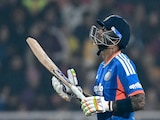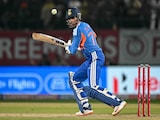What does the Nationalist Congress Party (NCP) have in common with the Shiv Sena?
To begin with, both were partners in the anti-BJP Maha Vikas Aghadi coalition that governed Maharashtra from November 2019 to June 2022.
The second parallel is that both parties split vertically and had one group crossing over to the BJP's camp. As is known, the breakaway groups or factions are now part of the coalition running the government since June 30 last year.
Significantly, Ajit Pawar parted ways with his uncle Sharad Pawar on Sunday July 2, almost exactly a year to the day Eknath Shinde became Chief Minister after quitting the ship steered by Uddhav Thackeray.
The third similarity is that both groups, after leaving the 'parent' party, have to negotiate the legal maze. Although the Election Commission recognised the Shinde-led Shiv Sena as the 'real' party, the Supreme Court in its judgment last month accepted the pre-eminence of the party organisation over the legislative wing.
The specific directive it issued was that the Maharashtra Speaker must decide the issue of disqualification of MLAs on the basis of the whip issued by the party wing and not the legislative party. Given that circumstances for the NCP could become similar, it will also have to face the same stipulations before matters related to the party's name and election symbol are decided.
There, however, is another big parallel between the two. In fact, both the Shiv Sena and NCP have been family-run parties and the breakaway groups are trying to turn them into separate non-family-run entities.
The Sena initially emerged as a party centred around an individual, driven by a powerful unifying idea or ideology. It transited into a family-run party with the succession of Uddhav Thackeray as its leader, and his son Aditya entered politics and took up significant roles within the party.
The NCP, to begin with, was not a family-run party. It was set up with leaders from outside Maharashtra in response to Sonia Gandhi's ascendance in the Congress. In time, Ajit Pawar was seen as the possible heir till Supriya Sule entered politics. Pawar Junior's move has to do principally with the fact that he lost to her in the succession battle.
The campaign against dynastic parties has been an effective narrative employed by Prime Minister Narendra Modi and his party to counter opponents. Seldom is there a political speech delivered by either Modi or any of the senior leaders of the BJP in which barbs are not aimed at 'dynasticism' or parivarvad.
It is worth recalling that Modi claimed while he was a kaamdaar leader (someone known for his work), Congress leader Rahul Gandhi was a naamdar person (someone known for his name).
There are instances when he ascribed the rise in support for his party to the "end of dynasty politics" and the "rise of 'parishramwadi' or hard work-oriented politics.
The campaign against family-run parties is unceasing. At the meeting of booth level workers of the BJP at Bhopal recently, Modi said the opposition only wants the growth of their families. He further said that dynastic parties must be fought if democracy has to be saved.
The Prime Minister also named several dynastic parties and their leaders. He said: "If you wish to benefit the Gandhi family, vote for Congress; if you wish to benefit the son of Mulayam Singh Yadav, vote for Samajwadi Party; if you wish to benefit sons and daughters of Lalu Prasad, vote RJD..."
He called out several other parties - DMK, National Conference, BRS and so on. But when it came to the NCP, he only named "the daughter of Sharad Pawar", while not mentioning the fact that Ajit Pawar was the original family heir who lost out because eventually Pawar Senior wanted to promote his own progeny and not the nephew.
However, it has to be accepted that after the two 'strikes', last year and now, Modi had clearly sent a message to family-run parties, that the BJP would not shy away from efforts to break these by offering allurements, at least in the form of positions, to leaders who are influential, have a personal support base, and are not from the family.
The BJP's targeting of the Sena and the NCP is a clear message, especially to smaller and regional parties, to either become inclusive or carry the risk of desertion by key non-family leaders who have the capacity to split these parties. They have to be particularly careful on matters related to succession, and long time loyalists have to be placated to ensure they too do not bolt to the BJP stable.
A part of the problem for these parties lies in the fact that most of them are breakaway factions from bigger non-family and ideologically moored parties. For instance, the Samajwadi Party, RJD, Janata Dal (Secular), and Lok Janshakti Party are among the splinters of the erstwhile Janata Dal, formed in the late 1980s by the merger of several parties. Many of these were splinter groups of the Janata Party that formed the first non-Congress government in India in 1977.
Interestingly, while Modi disparaged dynastic parties at the Bhopal meeting, he chose not to mention the Janata Dal (Secular) or the Lok Janshakti Party, with whom the BJP may eventually tie up.
In fact, the Lok Janshakti Party was a constituent of the NDA until Ram Vilas Paswan was alive. Quite clearly, the BJP has different standards when it comes to family-run parties with which it has political and electoral relationships.
There is a clear degree of difference in the way the BJP treats its members who are part of political families and how it views dynastic political leaders from other parties.
But it is important to accept that barring the BJP, the communist parties and maybe a few others (although their electoral significance is minuscule compared to the past), a majority of parties have a 'first family' which runs the party as per its whims and fancies.
Interestingly, despite its strident campaign against political dynasticism, the BJP has one of the largest contingents of lawmakers from political families in parliament. In the Union Cabinet too, there are members who made their initial mark in politics, courtesy prior "connection".
The BJP has also been very open to accepting dynastic leaders from other parties. This is possibly the reason why the BJP too has not made any effort to initiate legislative and electoral reform to counter dynasticism in Indian politics.
However, the BJP campaign against dynastic parties has struck a chord among its core supporters, because its leadership has so far not been dominated by political families and their members. The dynasts are certainly not the key decision makers, but their position and influence is used by the leadership to perpetuate their political hegemony.
The idea of a political family is steeped in feudalism but in order to retain their relevance, dynasts have opted for the vocabulary of democracy and the political empowerment of the underprivileged.
It is not that political families are unique to India. However, their prevalence, and resultant entrenchment, is far greater, which is why political families will remain an important factor for long. Realising this, the BJP has tried to accommodate them and use them to their advantage.
In the current scenario, it is highly unlikely that any political family, or a coalition of them, can acquire control over the party. Political families and family-run parties that are not politically aligned with the BJP shall have to remain on guard to ensure they do meet the same fate as the Shiv Sena or the NCP.
(The writer is an NCR-based author and journalist. His latest book is 'The Demolition and the Verdict: Ayodhya and the Project to Reconfigure India'. He has also written 'The RSS: Icons of the Indian Right' and 'Narendra Modi: The Man, The Times'.)
Disclaimer: These are the personal opinions of the author.















